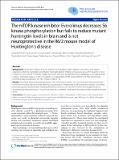| dc.contributor.author | Fox, Jonathan H | |
| dc.contributor.author | Connor, Teal | |
| dc.contributor.author | Dorsey, Kate | |
| dc.contributor.author | Kama, Jibrin A | |
| dc.contributor.author | Bleckmann, Dorothee | |
| dc.contributor.author | Betschart, Claudia | |
| dc.contributor.author | Hoyer, Daniel | |
| dc.contributor.author | Frentzel, Stefan | |
| dc.contributor.author | Paganetti, Paolo | |
| dc.contributor.author | Chopra, Vanita | |
| dc.contributor.author | DiFiglia, Marian | |
| dc.contributor.author | Hersch, Steven M. | |
| dc.date.accessioned | 2012-03-01T01:37:00Z | |
| dc.date.issued | 2010 | |
| dc.identifier.citation | Fox, Jonathan H., Teal Connor, Vanita Chopra, Kate Dorsey, Jibrin A. Kama, Dorothee Bleckmann, Claudia Betschart, et al. 2010. The mTOR kinase inhibitor Everolimus decreases S6 kinase phosphorylation but fails to reduce mutant huntingtin levels in brain and is not neuroprotective in the R6/2 mouse model of Huntington's disease. Molecular Neurodegeneration 5: 26. | en_US |
| dc.identifier.issn | 1750-1326 | en_US |
| dc.identifier.uri | http://nrs.harvard.edu/urn-3:HUL.InstRepos:8296054 | |
| dc.description.abstract | Background: Huntington's disease (HD) is a progressive neurodegenerative disorder caused by a CAG repeat expansion within the huntingtin gene. Mutant huntingtin protein misfolds and accumulates within neurons where it mediates its toxic effects. Promoting mutant huntingtin clearance by activating macroautophagy is one approach for treating Huntington's disease (HD). In this study, we evaluated the mTOR kinase inhibitor and macroautophagy promoting drug everolimus in the R6/2 mouse model of HD. Results: Everolimus decreased phosphorylation of the mTOR target protein S6 kinase indicating brain penetration. However, everolimus did not activate brain macroautophagy as measured by LC3B Western blot analysis. Everolimus protected against early declines in motor performance; however, we found no evidence for neuroprotection as determined by brain pathology. In muscle but not brain, everolimus significantly decreased soluble mutant huntingtin levels. Conclusions: Our data suggests that beneficial behavioral effects of everolimus in R6/2 mice result primarily from effects on muscle. Even though everolimus significantly modulated its target brain S6 kinase, this did not decrease mutant huntingtin levels or provide neuroprotection. | en_US |
| dc.language.iso | en_US | en_US |
| dc.publisher | BioMed Central | en_US |
| dc.relation.isversionof | doi: 10.1186/1750-1326-5-26 | en_US |
| dc.relation.hasversion | http://www.ncbi.nlm.nih.gov/pmc/articles/PMC2908080/pdf/ | en_US |
| dash.license | LAA | |
| dc.title | The mTOR Kinase Inhibitor Everolimus Decreases S6 Kinase Phosphorylation But Fails to Reduce Mutant Huntingtin Levels in Brain and is not Neuroprotective in the R6/2 Mouse Model of Huntington's Disease | en_US |
| dc.type | Journal Article | en_US |
| dc.description.version | Version of Record | en_US |
| dc.relation.journal | Molecular Neurodegeneration | en_US |
| dash.depositing.author | DiFiglia, Marian | |
| dc.date.available | 2012-03-01T01:37:00Z | |
| dash.affiliation.other | HMS^Neurology-Massachusetts General Hospital | en_US |
| dash.affiliation.other | HMS^Neurology-Massachusetts General Hospital | en_US |
| dc.identifier.doi | 10.1186/1750-1326-5-26 | * |
| dash.authorsordered | false | |
| dash.contributor.affiliated | DiFiglia, Marian | |
| dash.contributor.affiliated | Chopra, Vanita | |
| dash.contributor.affiliated | Hersch, Steven | |


